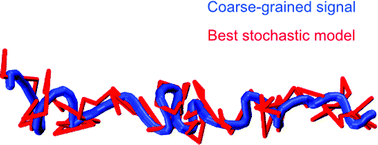Obtaining fully dynamic coarse-grained models from MD
Abstract
We present a general method to obtain parametrised models for the drift and diffusion terms of the Fokker–Planck equation of a coarse-grained description of molecular systems. The method is based on the minimisation of the relative entropy defined in terms of the two-time joint probability and thus captures the full dynamics of the coarse-grained description. In addition, we show an alternative Bayesian argument that starts from the path probability of a diffusion process which allows one to obtain the best parametrised model that fits an actual observed path of the coarse-grained variables. Both approaches lead to exactly the same optimisation function giving strong support to the methodology. We provide an heuristic argument that explains how both approaches are connected.

- This article is part of the themed collection: Multiscale modelling

 Please wait while we load your content...
Please wait while we load your content...